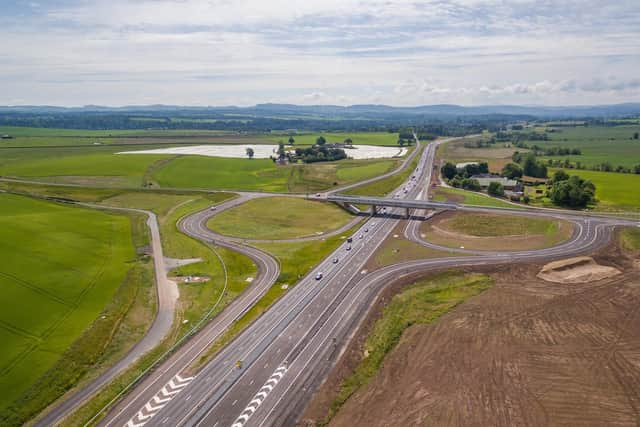A9: Damning report says engineers have known for 'years' road could not be dualled on time as Transport Scotland branded 'worst client in UK'
Civil engineers have known for “many years” the A9 could not be dualled by 2025, according to a damning new report that dubs Transport Scotland “the worst client to work for in the UK”.
The Civil Engineering Contractors Association (CECA) has written to the Scottish Parliament ahead of a meeting later this week to discuss progress to dual the A9 between Perth and Inverness.
Advertisement
Hide AdAdvertisement
Hide AdSo far only two sections of the road have been successfully completed – Luncarty to Pass of Birnam, and Kincraig to Dalraddy.


Last year there were 13 deaths on the road, leading to campaigners accusing the Scottish Government of treating the Highlands like a “forgotten backwater”.
Recently former transport minister Jenny Gilruth was forced to admit the project would not be completed by the initial target date of 2025. However, CECA now says this has been known within the industry for years.
The report also said the works that have been carried out so far went at a “glacial” pace and suggested the slowness was because the Government does not have enough money for it.
CECA says: “The civil engineering sector in Scotland has known for many years that the promise to dual the A9 by 2025 would not be met. The pace at which design and development work and subsequent road orders for each of the 11 sections has been carried out can be best described as being glacial.
“There is a suspicion amongst contractors that this slow pace has been deliberate as there has been sufficient budget allocated to allow these sections to be procured.”
CECA also says the issues highlighted by the significant delays to dualling the A9 are telling of a “much larger issue” around the processes and contracts used by Transport Scotland.
The wider industry started using what is called “new engineering contracts” in 1993 and this type of contract is now the “industry norm”. However, they are still not used by Transport Scotland, which has lead to their contracts being “dated” and “unattractive”.
Advertisement
Hide AdAdvertisement
Hide AdThe report added: “Transport Scotland is regarded by CECA members across the UK as the worst client to work for in the UK.”
CECA suggests there is a “change in culture” to move away from present behaviours within Transport Scotland, saying this will “result in better outcomes for all parties”.
The body added: “It is the contracting industry’s strongly held belief that Transport Scotland must totally abandon its existing bespoke contract and move over to using the new engineering contract suite of contracts if it is to regain the interest of the wider UK contracting industry in delivering future Scottish road improvements and enhancement, such as the dualling of the A9.”
CECA has now put forward four different approaches the Government could now use to dual the A9, including funding three larger sections directly from its capital budget, or breaking the road up into much smaller, more affordable chunks.
The CECA report, along with a public petition which has gathered more than 3,800 signatures, will be discussed when Holyrood’s public petition and citizen participation committee meets on Wednesday.
A spokesman for the Scottish Government said it remains “committed” to the project, saying it has already invested over £430 million.
It added Transport Scotland has a “long record of successful procurement”.
However it added: “They do acknowledge that recent years have seen a decline in the number of tenderers, in part due to the terms and conditions set out in the contract, including risk transfer.
Advertisement
Hide AdAdvertisement
Hide AdThey added the government has been working with CECA to better understand market conditions, particularly ahead of tendering the Tomatin to Moy section of the A9.
The spokesperson said: “Transport Scotland welcomes CECA’s contribution as an interested party as it considers the most appropriate approach to balancing the need to generate effective tender competition with the importance of protecting the public purse.
“This is a complex process, and we need to carefully guard against any unintended consequences.”
Comments
Want to join the conversation? Please or to comment on this article.